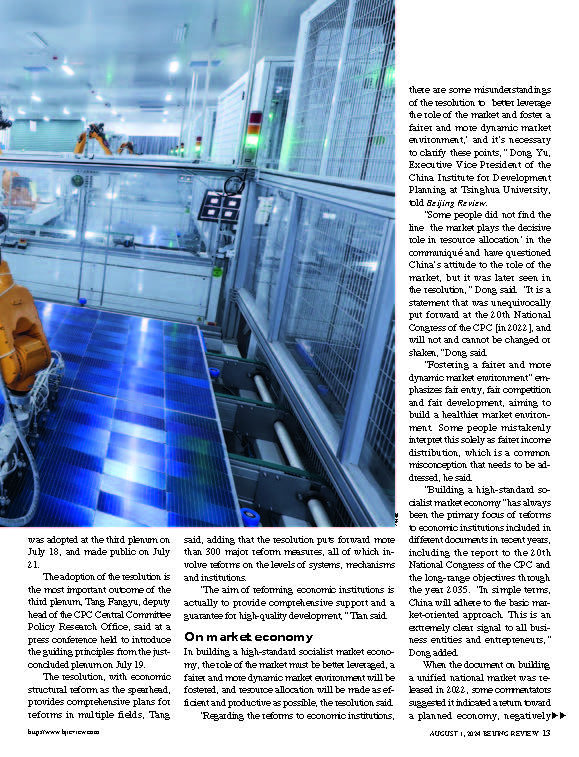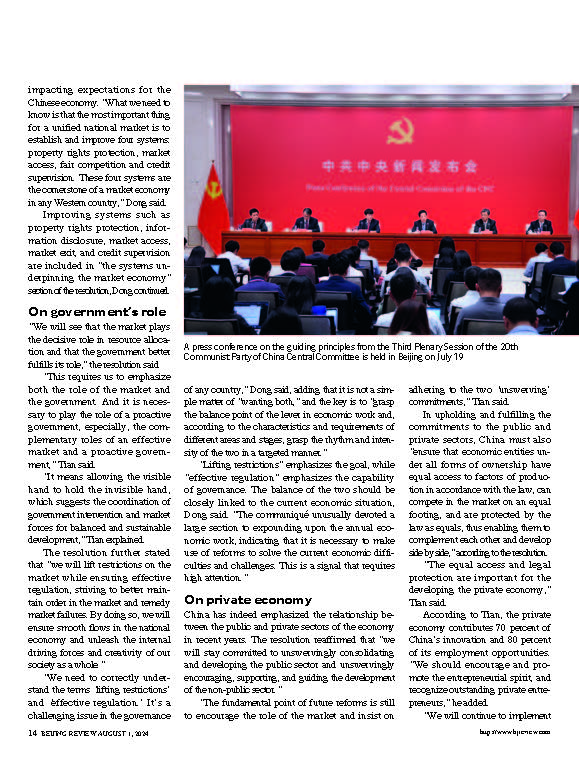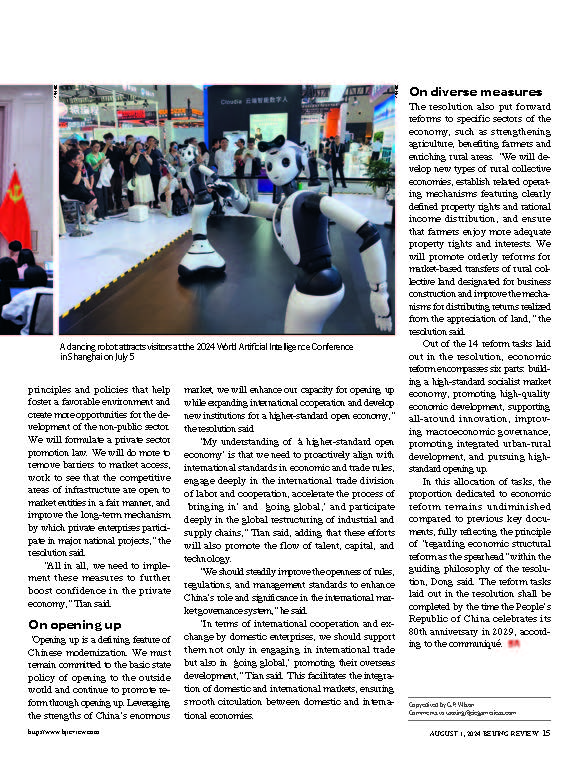受访者:田轩,第十四届全国人大代表,清华大学学术委员会委员,清华大学国家金融研究院院长,清华大学五道口金融学院副院长、金融学讲席教授;董煜,清华大学中国发展规划研究院常务副院长
来源:《北京周报》(BEIJING REVIEW) 2024年8月1日第31期
进一步全面深化改革,必须牵住“牛鼻子”。党的二十届三中全会审议通过了《中共中央关于进一步全面深化改革、推进中国式现代化的决定》,“以经济体制改革为牵引”列入指导思想,“构建高水平社会主义市场经济体制”成为“七个聚焦”之首,制定了“到2035年,全面建成高水平社会主义市场经济体制”的时间表。最新一期《北京周报》(BEIJING REVIEW) 就此推出封面文章“A PROACTIVE PLEDGE: Economic structural reform remains the spearhead in China”,并专访了清华大学中国新型城镇化研究院特聘专家田轩、董煜。
A PROACTIVE PLEDGE:
Economic structural reform remains the spearhead in China
Questions and speculations surrounding the future direction of China's economy, and whether it will continue pursuing reform and opening up, have predictably surfaced around the recently held Third Plenary Session of the 20th Central Committee of the Communist Party of China (CPC), which concluded with the release of a communiqué on July 18.
Some critics have asserted that politics is suffocating China's economy. Others have voiced opinions that while the words "reform" and "economic development" occur frequently throughout the communiqué, the document contains few specific details of the measures China will take to continue the revival of its economy.
However, those with seats closer to the action suggest these critics may be looking in the wrong places. "The communiqué is about principles and directions. It is relatively abstract," Tian Xuan, associate dean and chair professor of finance at Tsinghua University's PBC School of Finance, told Beijing Review. "In addition to studying the communiqué, we also need to study the resolution, which provides more specific measures," he added.
"I feel that this communiqué is all about economic development and reform. That's my personal understanding," he said.
The Resolution of the Central Committee of the Communist Party of China on Further Deepening Reform Comprehensively to Advance Chinese Modernization was adopted at the third plenum on July 18, and made public on July 21.
The adoption of the resolution is the most important outcome of the third plenum, Tang Fangyu, deputy head of the CPC Central Committee Policy Research Office, said at a press conference held to introduce the guiding principles from the just-concluded plenum on July 19.
The resolution, with economic structural reform as the spearhead, provides comprehensive plans for reforms in multiple fields, Tang said, adding that the resolution puts forward more than 300 major reform measures, all of which involve reforms on the levels of systems, mechanisms and institutions.
"The aim of reforming economic institutions is actually to provide comprehensive support and a guarantee for high-quality development," Tian said.
01 On market economy
In building a high-standard socialist market economy, the role of the market must be better leveraged, a fairer and more dynamic market environment will be fostered, and resource allocation will be made as efficient and productive as possible, the resolution said.
"Regarding the reforms to economic institutions, there are some misunderstandings of the resolution to 'better leverage the role of the market and foster a fairer and more dynamic market environment,' and it's necessary to clarify these points," Dong Yu, Executive Vice President of the China Institute for Development Planning at Tsinghua University, told Beijing Review.
"Some people did not find the line 'the market plays the decisive role in resource allocation' in the communiqué and have questioned China's attitude to the role of the market, but it was later seen in the resolution," Dong said. "It is a statement that was unequivocally put forward at the 20th National Congress of the CPC [in 2022], and will not and cannot be changed or shaken," Dong said.
"Fostering a fairer and more dynamic market environment" emphasizes fair entry, fair competition and fair development, aiming to build a healthier market environment. Some people mistakenly interpret this solely as fairer income distribution, which is a common misconception that needs to be addressed, he said.
"Building a high-standard socialist market economy" has always been the primary focus of reforms to economic institutions included in different documents in recent years, including the report to the 20th National Congress of the CPC and the long-range objectives through the year 2035. "In simple terms, China will adhere to the basic market-oriented approach. This is an extremely clear signal to all business entities and entrepreneurs," Dong added.
When the document on building a unified national market was released in 2022, some commentators suggested it indicated a return toward a planned economy, negatively impacting expectations for the Chinese economy. "What we need to know is that the most important thing for a unified national market is to establish and improve four systems: property rights protection, market access, fair competition and credit supervision. These four systems are the cornerstone of a market economy in any Western country," Dong said.
Improving systems such as property rights protection, information disclosure, market access, market exit, and credit supervision are included in "the systems underpinning the market economy" section of the resolution, Dong continued.
02 On government's role
"We will see that the market plays the decisive role in resource allocation and that the government better fulfills its role," the resolution said.
"This requires us to emphasize both the role of the market and the government. And it is necessary to play the role of a proactive government, especially, the complementary roles of an effective market and a proactive government," Tian said.
"It means allowing the visible hand to hold the invisible hand, which suggests the coordination of government intervention and market forces for balanced and sustainable development," Tian explained.
The resolution further stated that "we will lift restrictions on the market while ensuring effective regulation, striving to better maintain order in the market and remedy market failures. By doing so, we will ensure smooth flows in the national economy and unleash the internal driving forces and creativity of our society as a whole."
"We need to correctly understand the terms 'lifting restrictions' and 'effective regulation.' It's a challenging issue in the governance of any country," Dong said, adding that it is not a simple matter of "wanting both," and the key is to "grasp the balance point of the lever in economic work and, according to the characteristics and requirements of different areas and stages, grasp the rhythm and intensity of the two in a targeted manner."
"Lifting restrictions" emphasizes the goal, while "effective regulation" emphasizes the capability of governance. The balance of the two should be closely linked to the current economic situation, Dong said. "The communiqué unusually devoted a large section to expounding upon the annual economic work, indicating that it is necessary to make use of reforms to solve the current economic difficulties and challenges. This is a signal that requires high attention."
03 On private economy
China has indeed emphasized the relationship between the public and private sectors of the economy in recent years. The resolution reaffirmed that "we will stay committed to unswervingly consolidating and developing the public sector and unswervingly encouraging, supporting, and guiding the development of the non-public sector."
"The fundamental point of future reforms is still to encourage the role of the market and insist on adhering to the two 'unswerving' commitments," Tian said.
In upholding and fulfilling the commitments to the public and private sectors, China must also "ensure that economic entities under all forms of ownership have equal access to factors of production in accordance with the law, can compete in the market on an equal footing, and are protected by the law as equals, thus enabling them to complement each other and develop side by side," according to the resolution.
"The equal access and legal protection are important for the developing the private economy," Tian said.
According to Tian, the private economy contributes 70 percent of China's innovation and 80 percent of its employment opportunities. "We should encourage and promote the entrepreneurial spirit, and recognize outstanding private entrepreneurs," he added.
"We will continue to implement principles and policies that help foster a favorable environment and create more opportunities for the development of the non-public sector. We will formulate a private sector promotion law. We will do more to remove barriers to market access, work to see that the competitive areas of infrastructure are open to market entities in a fair manner, and improve the long-term mechanism by which private enterprises participate in major national projects," the resolution said.
"All in all, we need to implement these measures to further boost confidence in the private economy," Tian said.
04 On opening up
"Opening up is a defining feature of Chinese modernization. We must remain committed to the basic state policy of opening to the outside world and continue to promote reform through opening up. Leveraging the strengths of China's enormous market, we will enhance our capacity for opening up while expanding international cooperation and develop new institutions for a higher-standard open economy," the resolution said.
"My understanding of 'a higher-standard open economy' is that we need to proactively align with international standards in economic and trade rules, engage deeply in the international trade division of labor and cooperation, accelerate the process of 'bringing in' and 'going global,' and participate deeply in the global restructuring of industrial and supply chains," Tian said, adding that these efforts will also promote the flow of talent, capital, and technology.
"We should steadily improve the openness of rules, regulations, and management standards to enhance China's role and significance in the international market governance system," he said.
"In terms of international cooperation and exchange by domestic enterprises, we should support them not only in engaging in international trade but also in 'going global,' promoting their overseas development," Tian said. This facilitates the integration of domestic and international markets, ensuring smooth circulation between domestic and international economies.
05 On diverse measures
The resolution also put forward reforms to specific sectors of the economy, such as strengthening agriculture, benefiting farmers and enriching rural areas. "We will develop new types of rural collective economies, establish related operating mechanisms featuring clearly defined property rights and rational income distribution, and ensure that farmers enjoy more adequate property rights and interests. We will promote orderly reforms for market-based transfers of rural collective land designated for business construction and improve the mechanisms for distributing returns realized from the appreciation of land," the resolution said.
Out of the 14 reform tasks laid out in the resolution, economic reform encompasses six parts: building a high-standard socialist market economy, promoting high-quality economic development, supporting all-around innovation, improving macroeconomic governance, promoting integrated urban-rural development, and pursuing high-standard opening up.
In this allocation of tasks, the proportion dedicated to economic reform remains undiminished compared to previous key documents, fully reflecting the principle of "regarding economic structural reform as the spearhead" within the guiding philosophy of the resolution, Dong said. The reform tasks laid out in the resolution shall be completed by the time the People's Republic of China celebrates its 80th anniversary in 2029, according to the communiqué.







